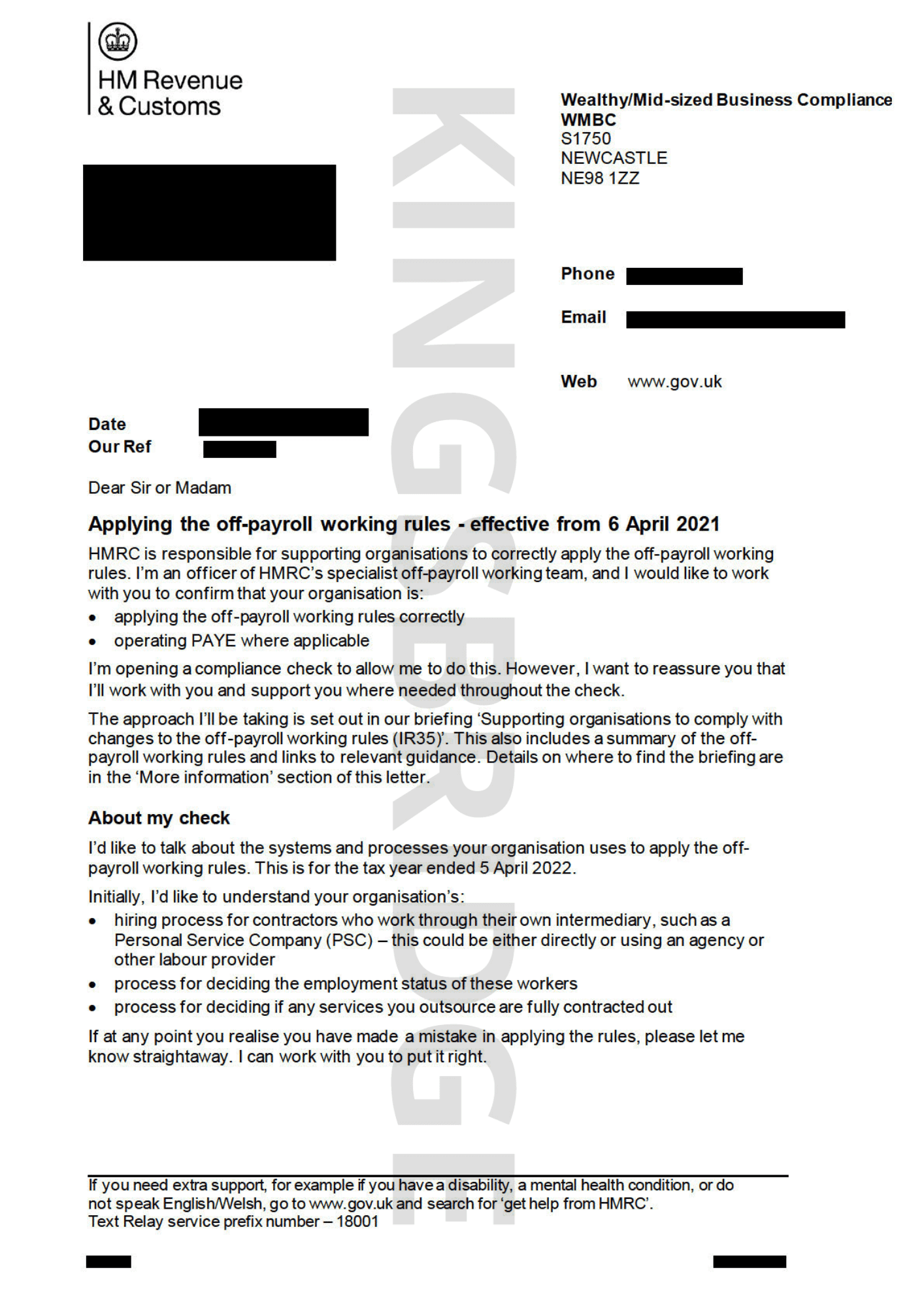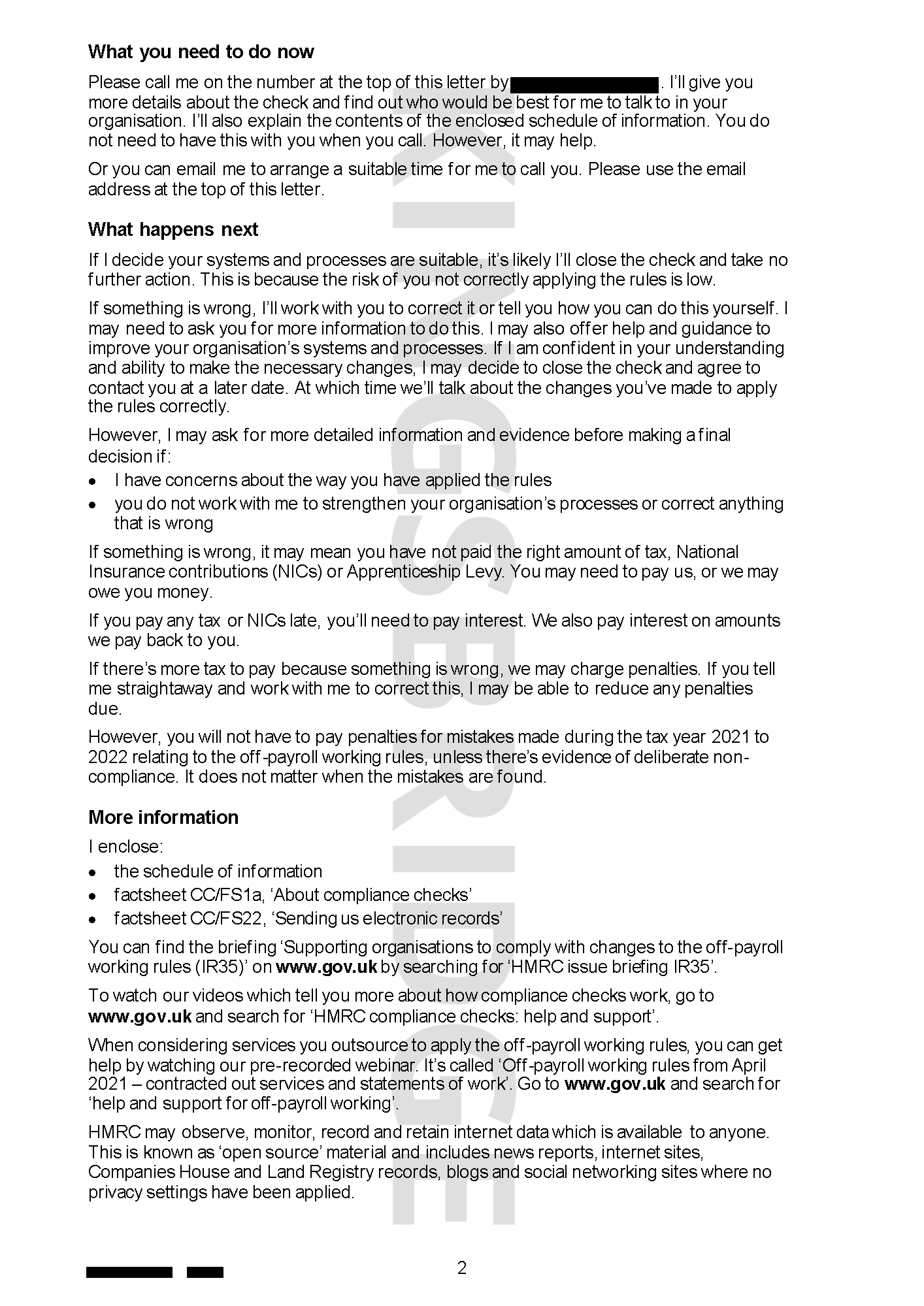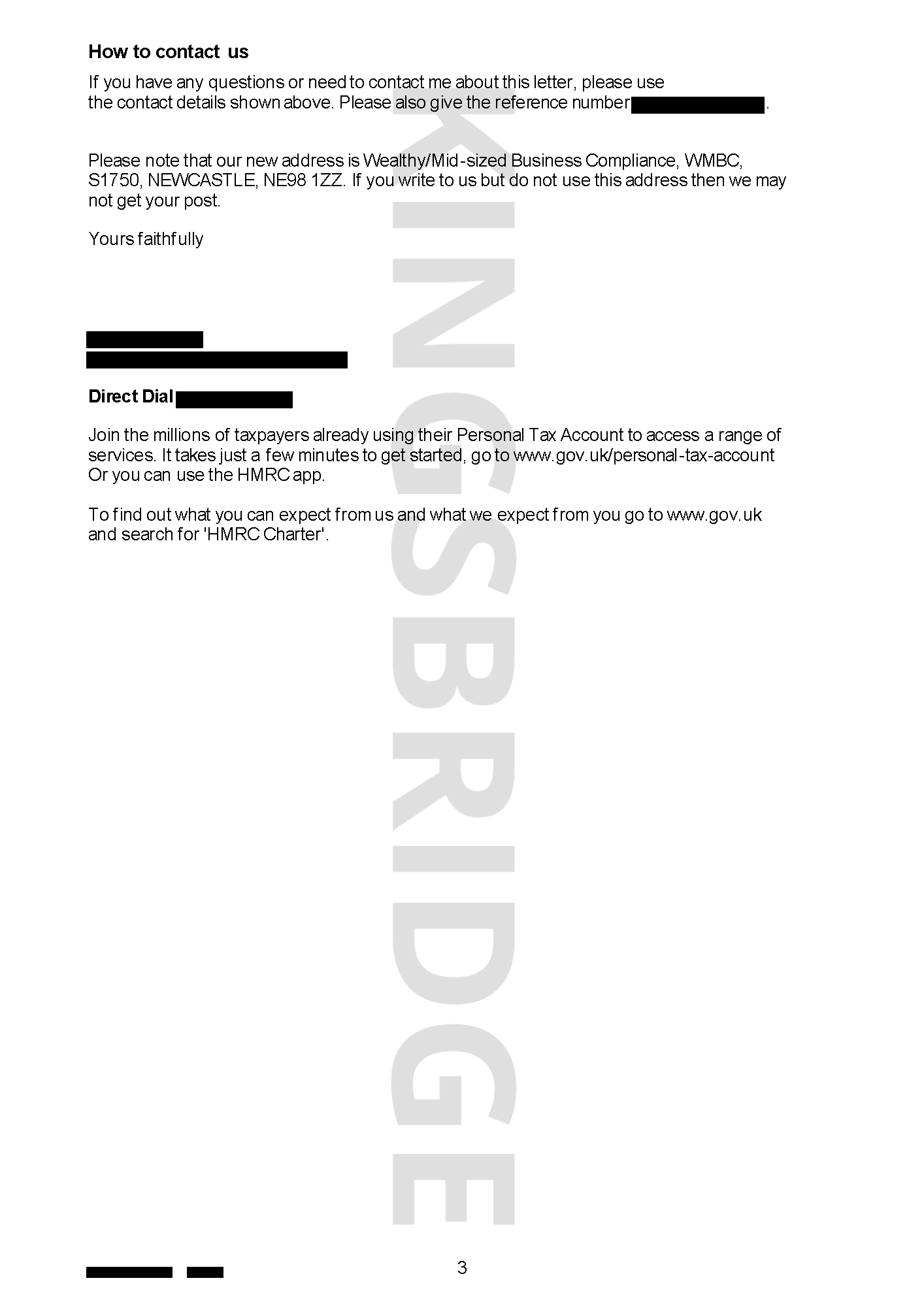FAQs from our IR35 webinar: Perfect Practice for HMRC claims
Last week, Kingsbridge IR35 experts Andy Vessey and Ryan Dawson joined forces for our webinar – Perfect Practice for HMRC…
Recently, some of our clients have been reporting back to us that they have been receiving letters from HMRC, informing…

Recently, some of our clients have been reporting back to us that they have been receiving letters from HMRC, informing them that an IR35 compliance check is being carried out. These letters (see example below) are being sent to end clients and, while this may be a trickle at the moment, it’s likely to cascade. Recently, Kingsbridge’s IR35 Project Manager Ryan Dawson hosted a webinar (watch here) with Head of Tax Andy Vessey to answer questions on these compliance checks and look at how businesses can protect themselves.
From the 6th April 2021 the IR35 reform came into play, and since then we have seen some compliance activity following the “bedding in” period. This has come in the form of letter requesting information from end client in order to check they are complying with the aforementioned rules.
The letters currently going out to end clients are different to previous IR35 compliance letters sent out by HMRC. Under the previous rules, the letters were sent to notify contractors that an IR35 enquiry was being launched. They asked for standard information such as an income breakdown for the period under review, copies of contracts and other documentation, plus other information that could assist an investigation. The tone of the letters was very direct and formal.
The new letters, however, are being sent to end clients rather than contractors, since end clients now hold the responsibility of determining a contractor’s IR35 status. The tone is – if not entirely soft – definitely non-aggressive. It’s very much in the vein of wanting to work with businesses to ensure they are applying the rules correctly. In fact, the focus is very much on collaboration, with HMRC stressing that the letter merely indicates a compliance check, not suspicion of wrongdoing.
Initially the letters state that HMRC would like an informal chat in order to ascertain compliance. However, as the letter also includes a schedule of information, it’s clear that the chat is just a starting point. It’s important to note that the requested information is not needed in advance of the chat.
The schedule of information requests a variety of things from end clients:
Once you have sent all of this information (and we give information on how to go about that below), compliance checks are risk assessed. If HMRC decides everything is in order, the check will be closed down. However…
If it’s determined that you are not compliant – and therefore you are a high risk – an investigation would likely be opened. This could see you or the fee payer (if that is a different organisation) owing HMRC money in unpaid taxes, National Insurance and/or the apprenticeship levy. The exact amount would be determined through the investigation.
If this investigation reveals that you, the end client, have not taken reasonable care when issuing a Status Determination Statement (SDS) then the liability for any fees and penalties could well revert to you, rather than the employment agency fee payer, if applicable.
It’s also worth noting that, as HMRC remain committed to their ‘soft landing’ approach in the first 12 months of off-payroll reform, there would be no penalties payable for those in receipt of compliance checks unless it is deemed that you have been deliberately non-compliant (i.e. you have committed fraud).
In situations where HMRC apply penalties, these are based on a percentage of the tax owed and levied based on behaviour, ranging from ‘careless’ to ‘deliberate non-compliance’. If you are deemed to have been careless and it’s your first offence, you can apply to have your penalty waived.
IR35 compliance checks can be time consuming, costly and stressful, therefore it is worthwhile having a specialist handle this matter on your behalf. Kingsbridge have a dedicated team of IR35 status experts, led by Andy Vessey, that can not only help ensure you have compliant systems and processes in place, but are also able to represent you during HMRC IR35 activity. We will then protect your position at all times and hold your organisation’s hand as we navigate HMRC’s questions to provide a positive and successful outcome to their curiosity.
Notwithstanding, the first and best way to protect yourself is, of course, to have compliant systems and processes in place. You should already have these, since the rules have been in effect for almost two years.
If proceeding without specialist support, the next thing to do is to follow the instructions laid out in the letter. This starts with having the ‘informal chat’ HMRC has requested. That is, of course, as long as it does remain informal.
You’re under no obligations to answer more detailed questions. If any come up, you are within your rights to say you cannot answer that right now and will be sending those details as part of the requested schedule of information.
It’s also a good idea to share news of the compliance check with other interested parties in the supply chain. You’re not obliged to do this, but it is courteous since it could have knock-on effects for them, particularly the fee payer.
Where insurance is in place, you should notify your insurance broker or claims handler prior to acting as well as notifying any independent tax advisers such as Kingsbridge where we can discuss the best strategy in order to shut down the check quickly.
Following that discussion, we can then gather the requested information and jointly review it before sending off to HMRC. This joint review will help flag areas that HMRC may query and potentially head them off.
For instance, while it’s advisable to avoid the use of employment terminology in documents pertaining to contractors, your organisation may use these terms as umbrella terms in dealing with all workers. If this is the case, you may want to add explainers in an accompanying letter so that HMRC does not flag this and query it.
In terms of how much information to give, Andy Vessey’s view is to provide no more and no less than HMRC has asked for, with the exemption of explainers to mitigate the risk of additional questions.
Of course, there are ways to protect your organisation even before you receive a letter from HMRC. IR35 insurance, for instance, can cover the fee payer’s risk by covering monies owed to HMRC as the result of an investigation. Kingsbridge’s Off-Payroll Protect is, as we speak, responding to claims arising from these letters, mitigating risk for many fee payers and providing vital support giving our clients the best chance of a successful outcome.
You may also wish to enlist Kingsbridge’s bespoke IR35 consultancy to help assess and resolve your IR35 risk. We do this through taking the time to understand your business and its specific requirements before producing a bespoke statement of works. To start, you can get in touch with an IR35 expert today.


